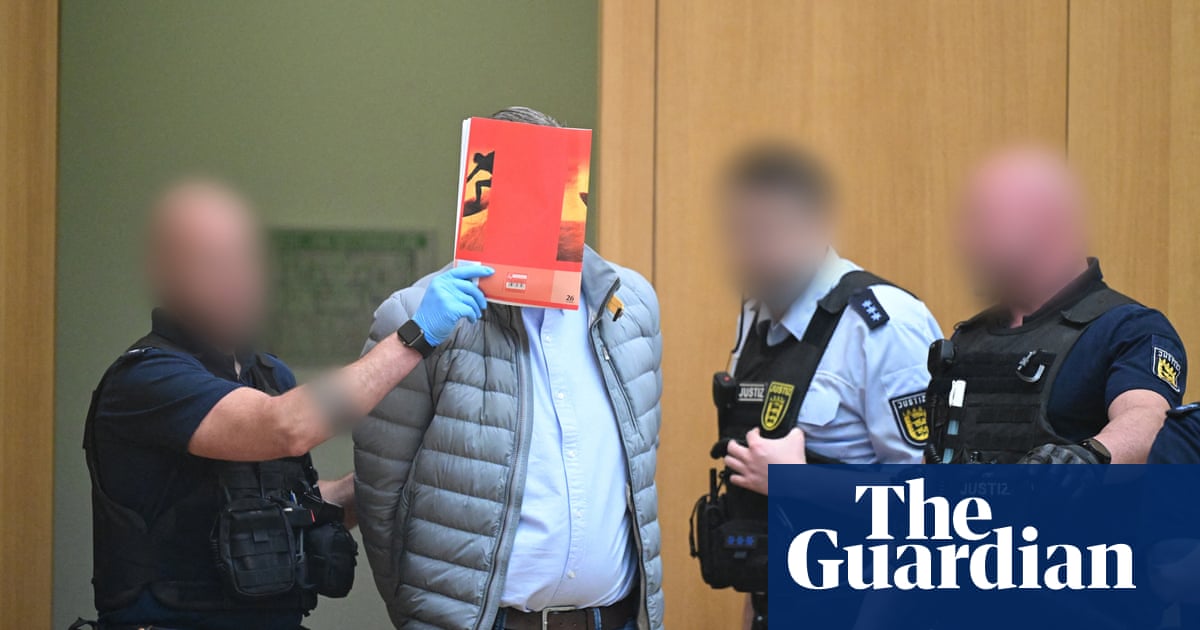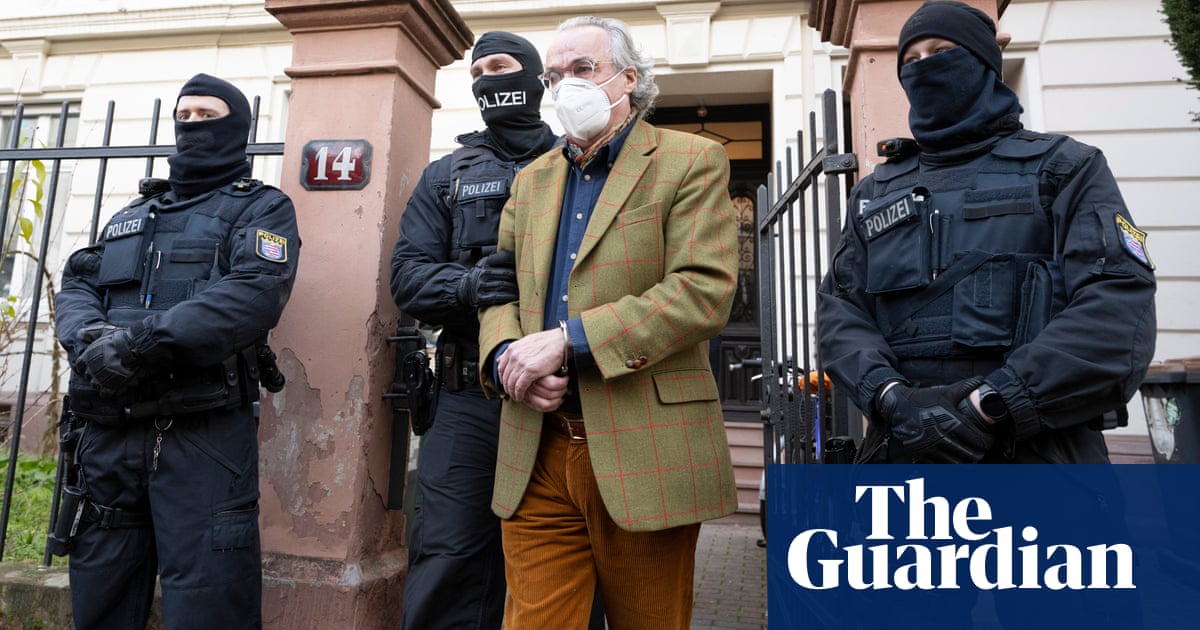
An alleged far-right plot led by a German aristocrat to overthrow the state that sought the backing of the Russian government has been thwarted in Germany, after a series of dawn raids across the country.
Twenty-five people including a 71-year-old prince, a retired military commander, and an acting judge and former MP for the far-right Alternative für Deutschland (AfD) were planning a violent overthrow of the state, including an armed attack on the parliament, inspired by the storming of the US Capitol, according to prosecutors.
The group was apparently driven in ideology by the deep-state conspiracy theories of QAnon and the Reichsbürger (“empire citizens”) movement, which denies the right of modern Germany to exist. It was planning to renegotiate the country’s post-second world war settlement, insisting the “Deutsche Reich” still had legitimacy despite having ended with the Nazis’ defeat in 1945.
Nancy Faeser, Germany’s interior minister, called the group the “enemies of democracy”, saying it was as yet unclear as to how advanced its plans had been, or how likely it was to have succeeded.
She said the government would respond against such plots with the “full force of the law”, adding: “The investigations provide a glimpse into the abyss of a terrorist threat from the Reichsbürger milieu.”
Relatives of the group’s alleged ringleader, Heinrich XIII, Prince Reuß von Greiz, who claims descent from a royal line that ruled for 800 years in Thuringia until the breakup of the German monarchy, told the Ostthüringer Zeitung newspaper in August he was a “bitter old man” with “crazy conspiracy theory views” who had turned his back on the family years ago. The family said it distanced itself “very clearly from his political and historical views”.
Peter Frank, Germany’s public prosecutor general, said the ringleaders of the group were being held in police custody. He confirmed reports that an armed wing of the group, which was meant to form the basis of a new German army and included former active members of the military, had planned to violently storm the German Bundestag or parliament.
“Those who have been arrested are supporters of conspiracy myths, from a conglomerate of narratives relating to the ideologies of the Reichsbürger and QAnon ideologies,” he told reporters in Karlsruhe.
The German president, Frank-Walter Steinmeier, told public radio he was “deeply concerned” by the alleged plot, describing it as a “new level”.
In what is believed to have been the biggest police investigation in Germany against extremists, a surveillance team under the auspices of the federal criminal police office (BKA) and the federal public prosecutor, began monitoring 52 suspects at the start of September under the codename “Shadows”, including monitoring telephones, chat groups and checking bank accounts. The operation followed a tip-off from someone in Berlin.
Investigators say they quickly established strong ideological links between the members, who included Reichsbürger, as well as members of the coronavirus denial Querdenker movement and supporters of the QAnon conspiracy theory.
The group, under the leadership of Heinrich XIII and a former commander of a paratrooper battalion, had been preparing for so-called “Day X”, on which about two dozen people were to storm the Reichstag building, home to the German parliament, and to handcuff and arrest MPs and parliamentary staff in an operation taking as its example the 2021 attack on the US Capitol.
After their takeover, the group had envisioned renegotiating the treaties Germany signed after the end of the second world war. “For now, the Russian Federation was exclusively to be the central contact for these negotiations,” prosecutors said.
While Heinrich XIII had made efforts to reach out to Moscow, prosecutors said: “There is no indication that the contacts reacted positively to his approach.” A Russian woman named only as Vitalia B, among those arrested on Wednesday, is suspected of having facilitated those contacts, prosecutors added.
Russia’s embassy in Berlin denied any Russian state involvement in the group. In a statement, it said: “Russian diplomatic and consulate offices in Germany have no contact to representatives of terrorist groups or other illegal units.”
As details of the group’s members emerged, they revealed what one investigator referred to as a “motley crew” – from a coronavirus-denying roofer to a gourmet cook, whose son-in-law is a professional footballer, a pilot with a German airline and a tenor who was due to be installed as culture minister after the group’s takeover.
German politicians expressed their relief that the plot had been thwarted, though Sara Nanni, of the Greens, said initial indications were that the group might have lacked the means or wherewithal to carry out their plan.
“More details keep coming to light that raise doubts about whether these people were even clever enough to plan and carry out such a coup,” she said in a post on the social media network Mastadon. However, she acknowledged that “no matter how crude their ideas and how hopeless their plans”, even the attempt was dangerous.
Federal prosecutors said 3,000 officers had conducted searches at 137 sites in 11 of Germany’s 16 states, including a palace in the state of Thuringia, and that 22 German citizens whad been detained on suspicion of “membership in a terrorist organisation”. Three other detainees, including a female Russian citizen, - reportedly Heinrich’s romantic partner – were suspected of supporting the organisation, they said.
Der Spiegel reported that locations searched included the barracks of Germany’s special forces unit, KSK, in the south-western town of Calw. The unit has in the past been scrutinised over alleged far-right involvement by some soldiers. Federal prosecutors declined to confirm or deny that the barracks was searched.
But among those arrested was a former senior field officer at the German army’s paratrooper battalion, identified as 69-year-old Rüdiger von Pescatore and believed to have been a commander in Calw. He was also described as a ring leader of the group.
He and Heinrich XIII had founded a “terrorist organisation last year with the goal of overturning the existing state order in Germany”, prosecutors said. The men planned to replace it with their own form of state, which was “already in the course of being founded”. Von Pescatore had been in charge of planning the military coup, and Heinrich XIII with mapping out Germany’s future political order.
They had even started to nominate ministers for a transitional post-coup government, according to the newspaper Die Zeit, in which one of the suspects, the former AfD MP Birgit Malsack-Winkemann, 58, a judge by profession, who was arrested at her home in the western Berlin district of Wannsee on Wednesday morning, was to be federal minister for justice.
Along with detentions in Germany, prosecutors said one person was detained in the Austrian ski-resort of Kitzbühel and another in Italy. Italian police confirmed the arrest around Wednesday lunchtime of a 64-year-old former German army officer connected to the group. He was detained in a hotel where “material pertaining to the group’s subversive activity” was found, according to Italian media. The man was expected to be extradited to Germany soon.
The group was said to be convinced modern Germany was run by a “deep state” conspiracy that was about to be exposed by an alliance of German intelligence agencies and the militaries of foreign states including Russia and the US.
“Everything will be turned upside down: the current public prosecutors and judges, as well as the heads of the health departments and their superiors will find themselves in the dock at Nuremberg 2.0,” one of the suspect said in a message posted on Telegram minutes before the start of Wednesday’s raids, Die Zeit reported.
While the suspects believed their aims could be achieved only by military means and with force, prosecutors said, it was unclear whether the group had managed to amass any serious kind of arsenal.
Several of the accused are former members of the military and are suspected of having illegally taken weapons out of the army’s stock during their years in service, while others hold arms licences.












